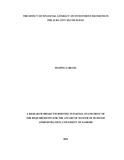| dc.description.abstract | The aimed at investigating the effect of financial literacy on investment decisions of employees of financial intuitions in South Sudan Juba City. The research study used a descriptive research design. The population of this study comprised of 28 Commercial Banks operating in South Sudan, 10 Micro Finance Institutions and 86 Forex Bureaus. The study used primary sources of data. Data was collected through the use of semi-structured questionnaires. Secondary data was obtained from internet, journals and newspapers. The responses to every question of the investment decisions dimensions were tabulated by use of analysis of variance and T-test techniques. The study carried out the measures of central tendency as descriptive statistics to describe the data. The study adopted a multiple linear regression model. Investment decision was the dependent variable independent variables were; spending patterns, savings literacy, debt management, retirement literacy, tax returns literacy. ANOVA (Analysis of Variance) showed the significance testing between and within Means of more than two observations. The study found that financial literacy at a very great extent influences entrepreneurs capability grasp advanced financial concepts such as risks & diversifications. The study concluded that financial literacy positively influences individuals‟ investment decisions. The study revealed that investment decisions positively correlate with retirement and savings literacy. The study recommended that employees at the financial institutions and related stakeholders in the economy should endeavor to improve their financial literacy skills in order to improve their personal wealth level. Also, the study recommended that retirement literacy and debt management need positive reinforcement(s) in driving positive growth in personal wealth. Finally, the study recommended that Tax returns literacy and spending patterns need close monitoring and control in personal wealth growth and management. | en_US |



